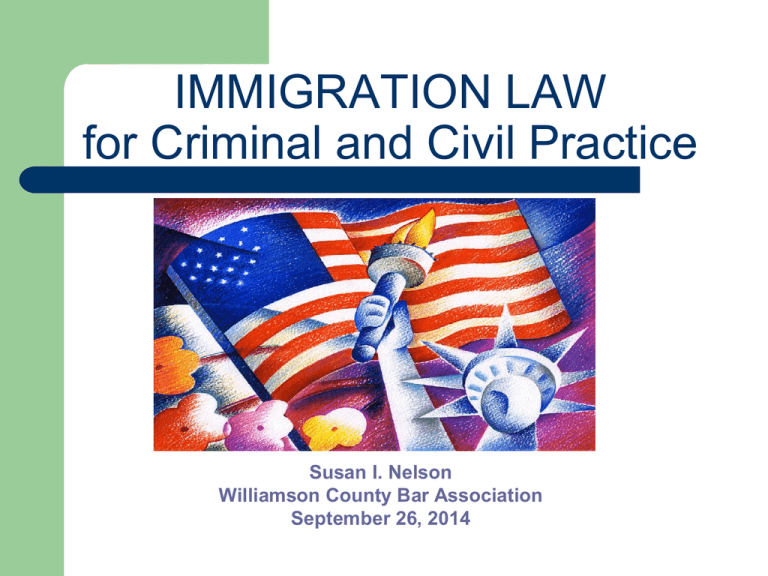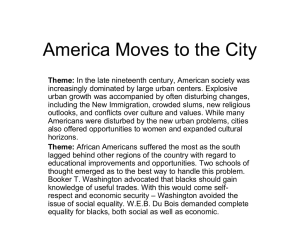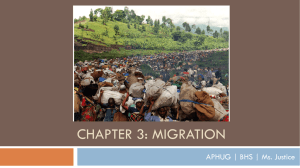
IMMIGRATION LAW
for Criminal and Civil Practice
Susan I. Nelson
Williamson County Bar Association
September 26, 2014
DROP THE I-WORD
The “I” word presumes someone is guilty of
illegal entry into the U.S.
DROP THE I-WORD
Use of the I-word affects attitudes toward
immigrants and non-immigrants alike,
including people of color.
The racially discriminatory message is not
explicit, but hidden or “coded.”
The term has deliberately been made
popular in the media by anti-immigrant
factions.
DROP THE I-WORD
ALTERNATIVES:
DREAMer (young people raised and
educated in the U.S.)
IMMIGRANT
UNDOCUMENTED IMMIGRANT
UNAUTHORIZED IMMIGRANT
IMMIGRATION CLASSIFICATIONS
U.S. Citizen
Immigrant
Nonimmigrant
Undocumented
U.S. Citizens
Born in the U.S.A.
Naturalized
Derived from U.S.C. parent
U.S. Citizens
Legal Permanent Resident
“Green card” holder
May live, work and travel in the U.S.
May not vote
Can be deported for
criminal or other grounds
Nonimmigrant
Visitor
Student
Temporary workers
Undocumented
Visa overstay
Entered without inspection
–
avoided border check points
No lawful status
–
Entered through border check point but did not
have visa or permission to enter
PATHS TO LPR STATUS
Family Based Visas
Employer Based Visas
Victim Visas
Asylum
VICTIM VISAS
Crime victims
Trafficking victims
Law enforcement agency must sign
document affirming cooperation for
Immigration
Provides a path to LPR
VAWA: Family violence victims who are
married to/children of USC/LPR
CRIMMIGRATION LAW
Padilla v. Kentucky, 559 U.S. 356 (2010)
The Padilla Rule
The Sixth Amendment requires that “counsel
must inform her client whether his plea
carries a risk of deportation.” Id. at 374.
Criminal counsel has the duty to investigate
and advise about immigration consequences
Padilla’s Classifications
Is the relevant immigration statute “succinct,
clear and explicit”?
Y = counsel must advise the non-citizen
defendant of the specific immigration
consequences
N = counsel has duty to advise that the plea might
carry adverse immigration consequences
Padilla’s Classifications
Relevant immigration statute “succinct, clear
and explicit:”
Aggravated robbery = CIMT, Ag.F if
sentence of >1 year
DWI ≠ CIMT, Ag. F (But watch for clients with
multiple convictions where aggregated
sentences >5 years)
Padilla Not Retroactive
Does not apply retroactively to cases already
final prior to the Padilla case. Chaidez v.
United States, 133 S.Ct. 1103, 1113 (2013)
Conviction
A formal judgment of guilt entered by the
court OR
If adjudication of guilt withheld where:
–
–
A judge or jury has found the noncitizen guilty or
the noncitizen has entered a plea of guilty or nolo
contedere or has admitted sufficient facts to
warrant a finding of guilt, and
The judge has ordered some form of punishment,
penalty, or restraint on the noncitizens liberty to
be imposed.
Conviction
Texas Deferred adjudication = conviction
A court-ordered drug treatment or domestic
violence counselling alternative = conviction
IF guilty plea is taken
Sentence includes any suspended sentence
Juvenile adjudication ≠ conviction IF
analogous to a federal juvenile delinquency
adjudication
Undocumented Clients
Conviction will most likely result in removal
proceedings
–
EXC: DACA eligible
Will the plea
–
–
disqualify client from relief from removal?
result in your client being detained?
Lawfully Present
Will the plea:
–
–
–
result in client being placed in deportation
proceedings?
disqualify client from relief from deportation?
result in your client being detained?
Will the client be able to leave and return to
the U.S.?
Will the client be able to Naturalize?
Aggravated Felony
Defined under 8 USC §1101(a)(43)
Murder, rape, sexual assault of a minor, drug
trafficking, firearm trafficking …
Crime of violence, theft or burglary where
sentence is “at least 1 year”
Fraud or tax evasion where loss to victim
>$10,000
Can be a misdemeanor
Controlled Substances
Violation of any law or regulation of a state,
the US or a foreign country related to a
controlled substance as defined in §102 of
the Controlled Substance Act
EXC: single offense of simple possession of
30g or less of marijuana
May also be an Aggravated Felony, CIMT
Crimes of Moral Turpitude
Not defined by statute
Crimes that are inherently evil or wrong
Eg., theft, fraud, serious violence, most sex
offenses
Petty Offense Exception: 1 CIMT, offense not
punishable by >1 year, not sentenced to >6
months
Crimes of Domestic Violence
Texas Penal Code §22.01(a)(1) is not a
crime of violence because it can be
committed recklessly. United States v.
Villegas-Hernandez, 468 F.3d 874, 882 (5th
Cir. 2006)
Record of conviction important
May be COV/CIMT if conduct intentional,
knowing
Firearms
Convicted at any time after admission under
any law of purchasing, selling, offering for
sale, exchanging, using, owning or
possession of a weapon, firearm or
destructive device
Ground of deportability
NOT a ground of inadmissibility BUT may
result in discretionary denial
Firearms
U.S. v. Portillo-Munoz, 643 F.3d 437 (5th Cir.
2011)
Federal statute prohibits aliens from
possessing firearms. 18 U.S.C. 922(g)(5)
Protections contained in Second Amendment
do not extend to aliens illegally present in the
United States. Id. at 442.
ICE Holds
Undocumented
Lawfully present charged with deportable
offense
Hold can be dropped prior to release in some
circumstances
ICE issues detainer and takes custody within
48 hours after release from local authorities
ICE Custody
NO REMOVAL
USC
LPR w/o conviction
Exercise of
prosecutorial
discretion
Eg., DACA
REMOVAL
Release on OR
Set bond and transfer to
detention
Refuse to set bond and
transfer to detention
ICE Detention/Bond
Transferred to ICE detention facility
Bond paid at ICE District Office (eg., San
Antonio)
If no bond or too high, can ask Immigration
Court to lower bond
Mandatory detention = must stay in custody
FAMILY LAW ISSUES
Termination of Parental Rights
In re E.N.C., 384 S.W.3d 796 (Tex. 2012)
Father convicted in another state of unlawful
conduct with a minor and given probation
years before the children were born was later
deported to Mexico.
No evidence concerning the offense nor the
circumstances of deportation offered.
Termination of Parental Rights
Trial court terminated father’s rights based
on criminal record and deportation. Id. at
801.
A divided Texarkana Court of Appeals,
affirmed finding that while the father’s
deportation alone could not support the trial
court’s findings, his conduct that led to
deportation did support the judgment. Id. at
801-802.
Termination of Parental Rights
Supreme Court reversed, holding that the
evidence was legally insufficient to support
termination.
“[D]eportation, like incarceration, is a factor
that may be considered (albeit an insufficient
one in and of itself to establish
endangerment), its relevance to
endangerment depends on the
circumstances.” Id. at 805.
Termination of Parental Rights
“[N]o reasonable fact-finder could have
formed a firm belief or conviction that the
termination of Francisco’s parental rights was
in the children’s best interest.” Id. at 809.
The Department never assessed father’s
situation in Mexico, and there was a lack of
evidence establishing the instability of the
father’s home in Mexico. Id. at 808.
Custody
Custody of Children in Mixed Status
Families: Preventing the Misunderstanding
and Misuse of Immigration Status in State
Court Custody Proceedings, 47 Family Law
Quarterly 191 (Summer 2013)
National Immigrant Women’s Advocacy
Project (NIWAP)
http://niwaplibrary.wcl.american.edu/
Custody
“[T]he Due Process Clause of the Fourteenth
Amendment protects the fundamental right of
parents to make decisions concerning the
care, custody, and control of their children.”
In re E.N.C. at 806.
“[O]verriding presumption that the … best
interests of the child are served by reuniting
the child with his or her parent.” In re
Angelica L., 767 N.W.2d 74, 94 (Neb. 2009)
Family Abuse
Immigration status exacerbates the level of
violence in abusive relationships when
batterers use the threat of deportation and
control of information about legal status to
lock their spouses and children in violent
relationships.
Family Abuse
Victims afraid to report abuse, leave, unable
to support self and children.
May be eligible for VAWA, U or T visas.
Immigrant detainees may have children
placed with the abuser while in detention.
Marriage
USCs and LPRs can petition for their
spouses to receive LPR status.
The marriage must be valid in the jurisdiction
where it was contracted.
Step-children where marriage occurred prior
to 18th birthday
Some stand to lose immigration benefits if
they marry (eg., son or daughter of LPR)
Divorce
No longer eligible for petitions based on
marriage relationship
–
EXC: VAWA
Affidavit of Support obligations continue after
divorce
Adoption
Non-citizen children adopted prior to 16th
birthday qualify as child under immigration
law (under 18 if younger siblings adopted)
Must be in physical and legal custody of
adoptive parents for 2 years prior to filing.
–
EXC: VAWA (abused children)
CIVIL LAW ISSUES
Immigration Status
TXI Transp. Co. v. Hughes, 306 S.W.3d 230,
245 (Tex. 2010)
Evidence impugning character based on
immigration status = Harmful error
Evidence admitted of driver/employee’s:
–
–
–
Prior deportation
Fake social security number
Lied to obtain a commercial DL
Immigration Status
Plaintiff argued that the evidence of
driver/employee’s immigration status was
relevant to issues of negligent hiring,
negligent entrustment and for impeachment
evidence.
Employer complained that the evidence was
not relevant to any issue in the case BUT
was highly prejudicial.
Immigration Status
Court concluded that neither immigration
status nor use of a fake SS# to obtain
commercial DL caused the collision.
Not admissible as impeachment evidence.
“[I]ts prejudice far outweighed any probative
value, but also because it fostered the
impression that [the employer] should be
held liable because it hired an illegal
immigrant.” Id.
Immigration Status
Justice Medina: “Such appeals to racial and
ethnic prejudices, whether ‘explicit and
brazen’ or ‘veiled and subtle,’ cannot be
tolerated because they undermine the very
basis of our judicial process.” Id.
Immigration Status
Tyson Foods v. Guzman, 116 S.W.3d 233,
247 (Tex. App.--Tyler 2003)
Texas law does not require citizenship or the
possession of immigration work authorization
permits as a prerequisite to recovering
damages for lost earning capacity.
Immigration Status
Republic Waste Services, Ltd. V. Martinez,
335 S.W.3d 401 (Tex. App.--Houston [1st
Dist.] 2011)
Trial court excluded evidence of decedent’s
lack of immigration status
Employer argued that the decedent may
have been deported and that it was relevant
to his future earnings.
Houston court affirmed trial court ruling.
Unlicensed Drivers
Williams v. Steves Industries, Inc., 699
S.W.2d 570 (Tex. 1985)
The fact that a driver is unlicensed does not
determine that the driver is in fact
incompetent.
Deferred Action for Childhood
Arrivals (DACA)
DACA
On June 15, 2012, Secretary of DHS, Janet
Napolitano, issued a memo authorizing
DACA
Temporary relief from deportation and
employment authorization for young people
who entered the U.S. as children
NOT the DREAM Act
Who Qualifies for DACA?
AGE REQUIREMENTS
Born after June 15, 1981
AND
Arrived in the U.S. before age 16
AND
Must be at least 15 to apply (unless in
removal proceedings)
Who Qualifies for DACA?
PRESENCE/RESIDENCE REQUIREMENTS
Continuously resided in the U.S. from June 15, 2007 to the
present (brief, casual or innocent absences do not disrupt)
AND
Physically present in the U.S. on June 15, 2012
AND
Entered without inspection before 6/15/2012
OR
immigration status expired before 6/15/ 2012
Who Qualifies for DACA?
EDUCATION
Graduated from High School
OR
Obtained a GED
OR
Currently in school
OR
Honorably discharged from U.S. military*
DACA Disqualifiers
Serious criminal record
DWI
Gang ties
Removal or deportation that interrupted
continuous presence
Unaccompanied Alien Children
UACs 2008-2014
Source: FY2008-FY2013: U.S.D.H.S., United States Border Patrol, Juvenile and Adult
Apprehensions – FY 2013; For FY2014, unpublished data provided by CBP to CRS.
*FY2014 figures from 10/1/2013-5/31/2014 (⅔ of fiscal year)
UACs 2014
TVPRA
Trafficking Victims Protection
Reauthorization Act (2008)
UAC from noncontiguous states (not Mexico)
–
–
–
placed in removal proceedings
Transferred to facilities run by the Office of
Refugee Resettlement (ORR) where they meet
with social workers and attorneys
HHS appoints independent child advocates for
particularly vulnerable UAC
TVPRA for Mexican UAC
Presumption of immediate return to home
country
No hearing before an immigration judge,
unless:
–
–
–
the child is identified as a victim of severe
trafficking,
demonstrates a credible fear of persecution, or
is unable to make independent decisions about
their options.
TVPRA for Mexican UAC
“No meaningful screening is being
conducted.” [Appleseed Foundation 2011
report]
TVPRA screening conducted by CBP officers
trained to repel external threats and without
child welfare, trauma, abuse and sexual
assault expertise.
Pressure on UACs to withdraw their
applications for admission to the US
UAC relief available
Special Immigrant Juvenile Status
–
–
–
Declared dependent by state court
Unable to reunite with 1 or more parents on
account of abuse, abandonment or neglect
Not in “best interest of the child” to return to
country
UAC relief available
Asylum
–
Unable or unwilling to return to home country due
to well-founded fear of persecution on account of
race, religion, nationality, political opinion or
membership in a particular social group
Trafficking Visa
Crime Victim Visa
Need for Legal Representation
Need for Legal Representation
Volunteer Opportunities
texasbar.com/immigration
Texasbar.com/volunteer
QUESTIONS?
www.nlftx.com
http://www.facebook.com/TexImmLaw
Twitter: @TexImmLaw









